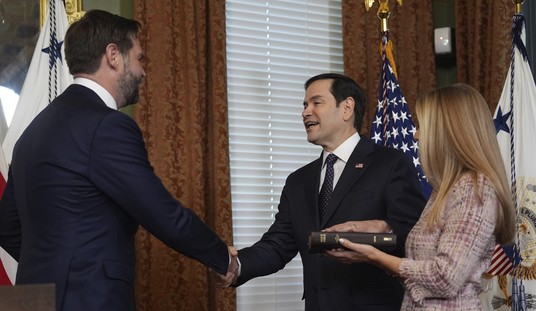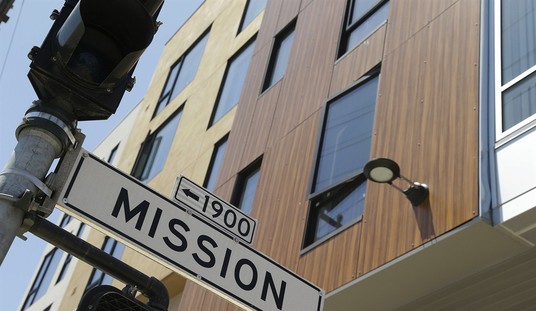The UN Security Council issued a non-specific call for a cease-fire in Gaza, as both sides continue to trade artillery fire. The unanimous but non-binding resolution makes no call on the conflict itself, but demands a return to the November 2012 cease-fire that Hamas has continuously violated almost since the ink dried on the agreement:
A council statement approved by all 15 members calls for de-escalation of the violence, restoration of calm and a resumption of direct negotiations between Israelis and Palestinians aimed at achieving a comprehensive peace agreement based on a two-state solution.
The statement calls for “the reinstitution of the November 2012 cease-fire” brokered by Egypt, but gives no time frame for when it should take effect.
Palestinian U.N. envoy, Riyad Mansour, said the Palestinians’ understanding is that the cease-fire should go into effect immediately.
That might be news to the Israelis, who demanded from the beginning that Hamas stop firing rockets into Israel to avoid a military conflict in the first place. Israel still says it will stop firing at Gaza as soon as Hamas stops firing at Israel. So far, though, Hamas continues to lob its missiles at Israeli population centers, even hitting the West Bank today:
#GAZA #ISRAEL (July12 #Beirut 19:33 ) Four Gaza rockets hit open areas in the #PalestinianAuthority. (Haaretz) #Hamas
— Beirut-Reporter (@beirutreporter) July 12, 2014
Today alone, Hamas has fired 34 missiles into Israel — and counting:
Gaza militants, who have launched hundreds of rockets at Israel since July 8, fired at least 34 at Israel today, the army said on Twitter. Two others were intercepted by the Iron Dome missile-defense system. Three Israelis were hurt yesterday, one seriously, when a rocket hit a gas station in Ashdod.
That report is misleading on one aspect. The Israelis began responding to the rocket fire on July 8, but the rocket fire ramped up for days prior to the launch of the Israeli counteroffensive. On July 4, the Israelis warned that continued fire of rockets into Israel would provoke a military response. Hamas fired dozens of rockets into Israel afterward, 70 on July 7 alone. That doesn’t take into account that Hamas regularly fires on Israel as a normal course of action, which is why Israel had to create Iron Dome in the first place.
There is little doubt that Gaza is getting the worst of it, though that’s better explained as a reason not to keep firing on a neighboring state with a powerful military:
The Israeli military released an aerial photo of the al-Farouq Mosque it said it hit in northern Gaza, saying Hamas hid rockets in it right next to another religious site and civilian homes.
“Hamas terrorists systematically exploit and choose to put Palestinians in Gaza in harm’s way and continue to locate their positions among civilian areas and mosques, proving once more their disregard for human life and holy sites,” said Lt. Col. Peter Lerner, an Israeli military spokesman.
Hamas said Israel hit two mosques in its operation Saturday. The competing claims could not be immediately reconciled, but the militant group said it hopes the attack galvanizes support in the Muslim world.
“The bombing of two mosques in Gaza overnight shows how barbaric this enemy is and how much is it hostile to Islam,” said Husam Badran, a Hamas spokesman in Doha, Qatar. “This terrorism gives us the right to broaden our response to deter this occupier.”
Actually, the “Muslim world” has much bigger problems on its plate at the moment in Syria and Iraq. It takes a certain amount of chutzpah for Hamas to provoke a military response by firing rockets indiscriminately at Israeli cities, and then demand that their lack of resources should (a) cause Israel to stop firing back, and (b) point to their losses as a crisis for everyone else. The Palestinian Authority tried to get a UN resolution demanding that Israel stop its Gaza offensive unilaterally, but that was a no go for this very reason.
By the way, the UN resolution was so effective that Hamas launched a volley of rockets at Tel Aviv shortly afterward:
BREAKING: Rocket sirens sound in Tel Aviv pic.twitter.com/QfchQS6H27
— Israel Defense Forces (@IDF) July 12, 2014
Jeffrey Goldberg writes about the lack of global response to the war, and concludes that Hamas may have made a huge miscalculation this time:
I’ve been struck, over the last few days, by the world’s indifference to Gaza’s fate. Perhaps this conflict has been demoted to the status of a Middle East sideshow by the cataclysms in Iraq and Syria. Perhaps even the most accommodationist European governments know that Israel is within its right to hunt down the people trying to kill its citizens. Regardless of the cause, Israel seems under less pressure than usual to curb its campaign.
There is no doubt that Hamas could protect Palestinian lives by ceasing its current campaign to end Israeli lives. The decision is Hamas’s. As the secretary-general of the United Nations, Ban Ki-moon, said yesterday, “We face the risk of an all-out escalation in Israel and Gaza, with the threat of a ground offensive still palpable — and preventable only if Hamas stops rocket firing.”
Goldberg points to the future that Gazans could have chosen rather than Hamas … in Kurdistan:
The politics of the moment are fascinating and dreadful, but what really interests me currently is a counterfactual: What if, nine years ago, when Israel withdrew its soldiers and settlers from Gaza, the Palestinians had made a different choice. What if they chose to build the nucleus of a state, rather than a series of subterranean rocket factories?
This thought is prompted by something a pair of Iraqi Kurdish leaders once told me. Iraqi Kurdistan is today on the cusp of independence. Like the Palestinians, the Kurds deserve a state. Unlike most of the Palestinian leadership, the Kurds have played a long and clever game to bring them to freedom.
This is what Barham Salih, the former prime minister of the Kurdistan Regional Government, told me years ago: “Compare us to other liberation movements around the world. We are very mature. We don’t engage in terror. We don’t condone extremist nationalist notions that can only burden our people. Please compare what we have achieved in the Kurdistan national-authority areas to the Palestinian national authority. … We have spent the last 10 years building a secular, democratic society, a civil society.” What, he asked, have the Palestinians built?
Gazans could have chosen the path of responsible statehood. Had they done so after the end of the Israeli occupation, Goldberg points out, the Israeli blockade would never have taken place, and Gaza could have been on its way to returning to its former status as a resort jewel on the Mediterranean. Instead, they chose Hamas, and war. When they get tired of war, perhaps they will choose more wisely in the future. Like the cease-fire, the choice is theirs to make.
For continuing coverage of the Gaza war, I’d suggest keepings tabs on my friend Carl at Israel Matzav for on-the-ground updates, and William Jacobson’s Legal Insurrection for the stateside view.








Join the conversation as a VIP Member